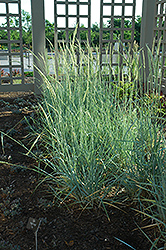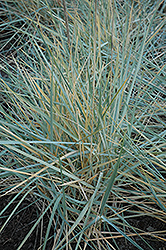Blue Dune Lyme Grass
Leymus arenarius 'Blue Dune'
Height: 3 feet
Spread: 3 feet
Sunlight:
![]()
![]()
Hardiness Zone: 2
Other Names: Elymus arenarius, Lymegrass
Ornamental Features
Blue Dune Lyme Grass' attractive grassy leaves are steel blue in color on a plant with an upright spreading habit of growth. The foliage often turns tan in fall. The tan seed heads are carried on spikes from mid summer to late fall.
Landscape Attributes
Blue Dune Lyme Grass is an herbaceous perennial grass with an upright spreading habit of growth. Its medium texture blends into the garden, but can always be balanced by a couple of finer or coarser plants for an effective composition.
This is a high maintenance plant that will require regular care and upkeep, and can be pruned at anytime. Gardeners should be aware of the following characteristic(s) that may warrant special consideration;
- Invasive
Blue Dune Lyme Grass is recommended for the following landscape applications;
- Groundcover
- Naturalizing And Woodland Gardens
- Container Planting
Planting & Growing
Blue Dune Lyme Grass will grow to be about 32 inches tall at maturity, with a spread of 3 feet. It tends to be leggy, with a typical clearance of 1 foot from the ground, and should be underplanted with lower-growing perennials. It grows at a fast rate, and under ideal conditions can be expected to live for approximately 10 years. As an herbaceous perennial, this plant will usually die back to the crown each winter, and will regrow from the base each spring. Be careful not to disturb the crown in late winter when it may not be readily seen!
This plant does best in full sun to partial shade. It is very adaptable to both dry and moist locations, and should do just fine under typical garden conditions. It is considered to be drought-tolerant, and thus makes an ideal choice for a low-water garden or xeriscape application. It is not particular as to soil type or pH, and is able to handle environmental salt. It is highly tolerant of urban pollution and will even thrive in inner city environments. This is a selected variety of a species not originally from North America. It can be propagated by division; however, as a cultivated variety, be aware that it may be subject to certain restrictions or prohibitions on propagation.
Blue Dune Lyme Grass is a fine choice for the garden, but it is also a good selection for planting in outdoor pots and containers. With its upright habit of growth, it is best suited for use as a 'thriller' in the 'spiller-thriller-filler' container combination; plant it near the center of the pot, surrounded by smaller plants and those that spill over the edges. It is even sizeable enough that it can be grown alone in a suitable container. Note that when growing plants in outdoor containers and baskets, they may require more frequent waterings than they would in the yard or garden.

